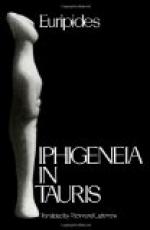Pp. 17, 18, 11. 342 ff.—A wonderful speech, illustrating the gradual breaking-up of the ice in Iphigenia’s nature.—The Herdsman’s story has, of course, been horrible to her; all the more so because he expects her to enjoy it and recalls wild words she has uttered in the past, when brooding on her wrongs. She controls her feelings absolutely till the man is gone. Then she feels like one turned to stone, pitiless; then, if only it were Helen or Menelaus that she had to kill! Then vivid thoughts of the misery and horror of Aulis and the poor foolish hopes and tremors in which she had come there; then the thought that Orestes, the one man whom she could love without resentment, is dead. Then a rage of indignation against the bloody rites and the infamy of the thing she has to do. She goes into the Temple broken in nerve and almost ready for rebellion.
P. 19, 11. 385 ff.—Leto, beloved of Zeus, was the mother of Artemis and Apollo, who were born in the holy island of Delos.— One legend, already rejected by Pindar, said that the crime of Tantalus was that he had given his child Pelops to the gods to eat.
P. 19, 1. 392, Dark of the sea.—The Dark-Blue of the Symplegades is meant. Sometimes it is only the Argo that has ever passed through them; here it is only Io, daughter of Inachus, loved by Zeus and hunted by the gadfly, who fled outcast through the East. Her story is told in Aeschylus’ Prometheus and in a magnificent chorus of his Suppliant Women. (See Rise of the Greek Epic, pp. 247 ff.)
The present lyric begins by wondering how and why the strangers have come: then come thoughts of the voyage and places they must have passed; the coast, where Phineus was haunted by the Harpies, the enchanted sea beyond the Symplegades, and the mysterious Isle of Leuce ("White”) where Achilles lives after death.—Then comes a thought of Iphigenia’s longing for revenge on Helen: but revenge is no use. It is home they crave, or, if that is impossible, then sleep and dreams of home.
P. 21, 1. 431, The steering oar abaft;—The steering was done by an oar, or sometimes two oars, projecting into the sea from a hole in the stern. Cf. 1. 1356, p. 83, “And through the stern dragged out the steering-blade.” If this oar was left free, it would ripple and beat against the side.
P. 23, 1. 472, What mother then was yours, &c.—Not very like a woman “turned to stone” or “without a tear.” She had miscalculated her own feelings.—Observe how Orestes sternly rejects her sentimental sympathy. He needs all his strength.
P. 25, 1. 512, A kind of banishment.—He was driven by his Furies, not legally banished.
Pp. 26, 27, 11. 515 and 529, “Oh how sweet to see thee here!” and “Oh, give me this hour full. Thou wilt soon die.”—Iphigenia is more than tactless. She is so starving for home or anything that brings her into touch with home, that neither this Stranger’s death nor anything else matters to her in comparison. A fine dramatic stroke.




